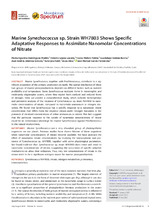Marine Synechococcus sp. Strain WH7803 Shows Specific Adaptative Responses to Assimilate Nanomolar Concentrations of Nitrate
Autor
Domínguez-Martín, María A.
López-Lozano, Antonio
Melero-Rubio, Yesica
Gómez-Baena, Guadalupe
Jiménez-Estrada, Juan Andrés
Kukil, Kateryna
Díez, Jesús
García-Fernández, José Manuel
Editor
American Society for MicrobiologyFecha
2022Materia
Synechococcus WH7803Nitrate
Nitrogen metabolism
Proteomics
Transcriptomics
METS:
Mostrar el registro METSPREMIS:
Mostrar el registro PREMISMetadatos
Mostrar el registro completo del ítemResumen
Marine Synechococcus, together with Prochlorococcus, contribute to a significant proportion of the primary production on Earth. The spatial distribution of these two groups of marine picocyanobacteria depends on different factors such as nutrient availability and temperature. Some Synechococcus ecotypes thrive in mesotrophic and moderately oligotrophic waters, where they exploit both oxidized and reduced forms of nitrogen. Here, we present a comprehensive study, which includes transcriptomic and proteomic analyses of the response of Synechococcus sp. strain WH7803 to nanomolar concentrations of nitrate, compared to micromolar ammonium or nitrogen starvation. We found that Synechococcus has a specific response to a nanomolar nitrate concentration that differs from the response shown under nitrogen starvation or the presence of standard concentrations of either ammonium or nitrate. This fact suggests that the particular response to the uptake of nanomolar concentrations of nitrate could be an evolutionary advantage for marine Synechococcus against Prochlorococcus in the natural environment.
Descripción
Datos de investigación disponibles en: https://www.ncbi.nlm.nih.gov/bioproject/PRJNA830281

